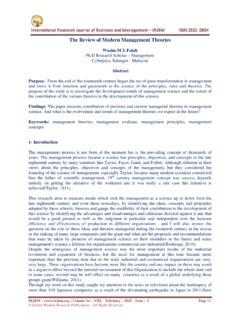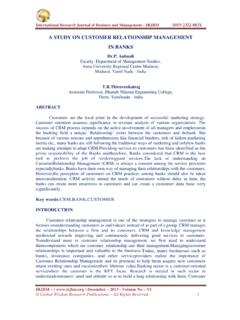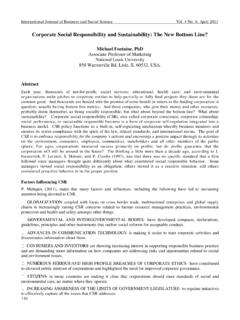Transcription of Corporate Social Responsibility of Pharmaceutical ...
1 IRJBM ( ) Volume No VIII, January 2015, Issue 2 Page 15 Global Wisdom Research Publications All Rights Reserved. Corporate Social Responsibility of Pharmaceutical Companies in India Senthil Vadivu .S Raja . Research Scholars, Department of Commerce, College of Arts & Science, Tiruchengode, TN - India INTRODUCTION Social Responsibility (is the) Responsibility of an organisation for the impacts of its decisions and activities on society and the environment through transparent and ethical behaviour that is consistent with sustainable development and the welfare of society; takes into account the expectations of stakeholders; is in compliance with applicable law and consistent with international norms of behaviour; and is integrated throughout the organisation.
2 Corporate Social Responsibility (CSR) is also known by a number of other names. These include Corporate Responsibility , Corporate accountability, Corporate ethics, Corporate citizenship or stewardship, responsible entrepreneurship, and triple bottom line, to name just a few. As CSR issues become increasingly integrated into modern business practices, there is a trend towards referring to it as responsible competitiveness or Corporate sustainability. The World Business Council for Sustainable Development has described CSR as the business contribution to sustainable economic development. Building on a base of compliance with legislation and regulations, CSR typically includes beyond law commitments and activities pertaining to: Corporate Governance and Ethics; Health and Safety; Environmental Stewardship; Human rights (including core labour rights); Sustainable Development; Conditions of Work (Including Safety And Health, Hours Of Work, Wages); Industrial Relations; WHY HAS CSR BECOME IMPORTANT?
3 In the flat world, with lengthy global supply chains, the balance of power between global companies and the individual communities in which they operate is tilting more and more in favor of the As such these companies are going to command more power, not only to create value but also to transmit values, than any other institution on the planet Many factors influences have led to increasing attention being devoted to the role of companies and CSR. These include: Sustainable Development: United Nations (UN) studies and many others have underlined the fact that humankind is using natural resources at a faster rate than they are being replaced. If this continues, future generations will not have the resources they need for their development. In this sense, much of current development is unsustainable it can t be continued for both practical and moral reasons.
4 Related issues include the need for greater attention to poverty alleviation and respect for human rights. CSR is an entry point for understanding sustainable development issues and responding to them in a firm s business strategy. Globalization: With its attendant focus on cross-border trade, multinational enterprises and global supply chains economic globalization is increasingly raising CSR concerns related to human resource management practices, environmental protection, and health and safety, among other can play a vital role in detecting how business impacts labour conditions, local communities and economies, and what steps can be taken to ensure business helps to maintain and build the public good. This can be especially important for export-oriented firms in emerging economies.
5 IRJBM ( ) Volume No VIII, January 2015, Issue 2 Page 16 Global Wisdom Research Publications All Rights Reserved. Governance: Governments and intergovernmental bodies, such as the UN, the Organisation for Economic Co-operation and Development (OECD) and the International Labour Organization (ILO) have developed various compacts, declarations, guidelines, principles and other instruments that outline norms for what they consider to be acceptable business conduct. CSR instruments often reflect internationally-agreed goals and laws regarding human rights, the environment and anti-corruption. Corporate sector impact: The sheer size and number of corporations, and their potential to impact political, Social and environmental systems relative to governments and civil society, raise questions about influence and accountability.
6 Even small and medium size enterprises (SMEs), which collectively represent the largest single employer, have a significant impact. Companies are global ambassadors of change and values. How they behave is becoming a matter of increasing interest and importance. Communications: Advances in communications technology, such as the Internet and mobile phones, are making it easier to track and discuss Corporate activities. Internally, this can facilitate management, reporting and change. Externally, NGOs, the media and others can quickly assess and profile business practices they view as either problematic or exemplary. In the CSR context, modern communications technology offers opportunities to improve dialogue and partnerships. Finance: Consumers and investors are showing increasing interest in supporting responsible business practices and are demanding more information on how companies are addressing risks and opportunities related to Social and environmental issues.
7 A sound CSR approach can help build share value, lower the cost of capital, and ensure better responsiveness to markets. Ethics: A number of serious and high-profile breaches of Corporate ethics resulting in damage to employees, shareholders, communities or the enviCorporate Social Responsibility : An Implementation Guide for Business environment as well as share price have contributed to elevated public mistrust of corporations. A CSR approach can help improve Corporate governance, transparency, accountability and ethical standards. Consistency and Community: Citizens in many countries are making it clear that corporations should meet the same high standards of Social and environmental care, no matter where they operate. In the CSR context, firms can help build a sense of community and shared approach to common problems.
8 Leadership: At the same time, there is increasing awareness of the limits of government legislative and regulatory initiatives to effectively capture all the issues that CSR address. CSR can offer the flexibility and incentive for firms to act in advance of regulations, or in areas where regulations seem unlikely. Business Tool: Businesses are recognizing that adopting an effective approach to CSR can reduce the risk of business disruptions, open up new opportunities, drive innovation, enhance brand and company reputation and even improve efficiency. CSR IN INDIA - PUTTING Social -ECONOMIC DEVELOPMENT ON A FAST TRACK When it comes to Social Responsibility of Pharma companies, the Pharma companies need to move beyond a narrow definition of CSR and look at some of the ways to alleviate poverty.
9 CSR is a concept whereby Pharmaceutical companies not only consider their profitability and growth, but also the interests of society and the environment by taking re-sponsibility for the impact of their activities on stakeholders, employees, shareholders, customers, suppliers, and civil society represented by NGOs. CSR has become increasingly prominent in the Indian Corporate scenario because organizations have realized that besides growing their businesses it is also vital to build trustworthy and sustainable relationships with the community at large. This is one of the key drivers of CSR programs. IRJBM ( ) Volume No VIII, January 2015, Issue 2 Page 17 Global Wisdom Research Publications All Rights Reserved. Another reason fuelling this rapid adoption of CSR is the state of the Indian society.
10 Though India is one of the fastest growing economies, socio-economic problems like poverty, illiteracy, lack of healthcare etc. are still ubiquitous and the government has limited resources to tackle these challenges. This scenario has opened up several areas for businesses to contribute towards Social development. CSR is not a new concept in India. Today, CSR in India has gone beyond merely charity and donations, and is approached in a more organized fashion. It has become an integral part of the Corporate strategy. Companies have CSR teams that devise specific policies, strategies and goals for their CSR programs and set aside budgets to support them. Pharmaceuticals CSR programs primarily focus on health and healthy living. They work in tribal villages where they provide medical check-up and treatment, health camps and health awareness programs.












